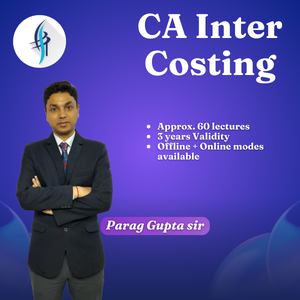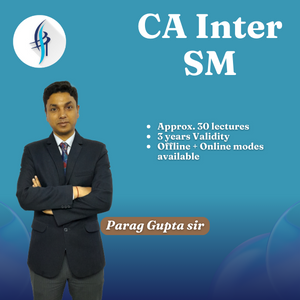CA Inter Group 1: Introduction
Welcome to the world of chartered accounting! As you embark on your journey to become a chartered accountant, it’s crucial to understand the significance of CA Inter Group 1. In this blog post, we will provide you with a comprehensive overview of CA Inter Group 1, highlighting its subjects, key concepts, study tips, examination pattern, and the crucial role it plays in shaping your foundational knowledge.
Subjects in CA Inter Group 1:
CA Inter Group 1 consists of four core subjects that lay the groundwork for your accounting expertise and form the building blocks of your chartered accounting journey:
Accounting:
Accounting is the language of business. Information about finances is systematically recorded, analyzed, and interpreted. In this subject, you will delve into the principles and techniques of financial accounting, gaining a solid understanding of financial statements, their preparation, and their analysis. These skills are vital for making informed business decisions, evaluating the financial health of an organization, and ensuring compliance with accounting standards.
Corporate and Other Laws:
Corporate and Other Laws focus on the legal framework that governs corporate entities. You will explore company law provisions, contract law, intellectual property law, and other relevant legislation. Understanding these laws and their implications is essential for ensuring ethical business practices, navigating legal complexities, and protecting the interests of stakeholders.
Cost and Management Accounting:
Cost and Management Accounting equips you with the knowledge and skills to effectively manage costs within an organization. You will learn about cost concepts, costing methods, cost control techniques, budgeting, and variance analysis. This subject enables you to understand the costs associated with different business activities, make informed pricing decisions, optimize resource allocation, and improve overall operational efficiency.
Taxation:
Taxation is a fundamental aspect of financial planning and compliance. In this subject, you will study the principles and provisions of direct and indirect taxes. You will gain insights into income tax regulations, including heads of income, deductions, exemptions, and tax planning strategies. Additionally, you will explore Goods and Services Tax (GST) principles and compliance procedures. Understanding taxation is crucial for providing sound advice on tax planning, ensuring compliance, and making informed financial decisions.
Key Concepts and Topics:
Within each subject in Group 1, there are key concepts and topics that you will encounter. Here’s a brief overview:
Accounting:
Accounting Standards and Principles: Gain a solid understanding of the accounting frameworks and guidelines that govern financial reporting, such as the Generally Accepted Accounting Principles (GAAP) and the International Financial Reporting Standards (IFRS).
Financial Statements: Learn to prepare and analyze balance sheets, income statements, cash flow statements, and statements of changes in equity to assess an organization’s financial position, performance, and cash flows.
Corporate and Other Laws:
Company Law Provisions: Understand the legal requirements and regulations for the formation, management, and dissolution of companies, including aspects like incorporation, corporate governance, meetings, and corporate restructuring.
Contract Law: Explore the principles and essentials of contracts, including contract formation, terms, performance, breach, and remedies.
Cost and Management Accounting:
Costing Methods: Familiarize yourself with different costing methods, such as job costing, process costing, standard costing, and activity-based costing.
Budgeting and Variance Analysis: Learn to develop budgets, monitor performance, and analyze variances between actual and budgeted results to identify areas for improvement and take corrective actions.
Taxation:
Heads of Income: Understand the different categories of income, such as salary, house property, capital gains, and business profits, and the corresponding tax implications.
Tax Planning Strategies: Explore various tax planning techniques and provisions that can help individuals and businesses minimize their tax liabilities within the legal framework.
Study Tips and Strategies:
To effectively tackle CA Inter Group 1, consider implementing the following study tips and strategies:
Create a Study Plan:
Develop a well-structured study plan that covers all subjects and allows sufficient time for each topic. Break down the syllabus into manageable portions and allocate specific study slots for each subject.
Understand the Syllabus:
Take the time to thoroughly review the syllabus for each subject. Identify the key concepts, subtopics, and weightage of marks to prioritize your study efforts accordingly.
Utilize Study Materials:
Make use of comprehensive study materials such as textbooks, reference books, study guides, and online resources. These resources provide in-depth explanations, examples, and practice questions to enhance your understanding.
Practice with Past Papers and Mock Exams:
Solving past papers and attempting mock exams is an effective way to familiarize yourself with the exam format, time constraints, and types of questions asked. Regular practice will improve your speed, accuracy, and confidence.
Seek Clarification and Guidance:
If you come across challenging concepts or have doubts, don’t hesitate to seek clarification from your teachers, mentors, or fellow students. Engage in discussions, join study groups, or participate in online forums to gain different perspectives and deepen your understanding.
Revise Regularly:
Regular revision is essential to reinforce your knowledge and retain information. Set aside dedicated time for revision, create concise notes or flashcards summarizing key points, and revisit important topics frequently to ensure long-term retention.
Examination Pattern and Grading:
It’s crucial to familiarize yourself with the examination pattern and grading system for CA Inter Group 1:
Examination Pattern:
CA Inter Group 1 consists of four papers, each carrying a specific weightage of marks. The exams are conducted in a descriptive format, where you are required to provide detailed written answers. The duration of each paper is typically three hours.
Grading System and Passing Criteria:
To pass Group 1, you must obtain a minimum of 40% in each subject. Moreover, to clear the overall Group 1 examination, you need to achieve an aggregate of at least 50% marks across all the papers.
Common Challenges and How to Overcome Them:
Preparing for CA Inter Group 1 can present some challenges, but with the right approach, you can overcome them.
Time Management:
The vast syllabus of Group 1 subjects can be overwhelming. To manage your time effectively, create a study schedule, prioritize topics based on their weight, and allocate dedicated time for each subject. Break down your study sessions into smaller, focused intervals to maintain productivity.
Understanding Complex Concepts:
Some concepts may seem complex at first. Take the time to thoroughly read through the study materials, make use of additional resources such as reference books and online tutorials, and seek clarification from your teachers or fellow students. Break down complex concepts into simpler parts to grasp them more easily.
Exam Preparation and Revision:
Planning your exam preparation strategically is vital. Practice solving past papers and attempting mock exams to familiarize yourself with the exam format, improve time management skills, and identify your weak areas. Regular revision of the subjects and topics will help you reinforce your understanding and retain information effectively.
Stress Management:
The CA Inter journey can be demanding, and stress is a common factor. Find healthy ways to manage stress, such as engaging in regular exercise, practicing relaxation techniques like deep breathing or meditation, getting enough sleep, and maintaining a balanced lifestyle. Taking breaks during study sessions, pursuing hobbies, and spending time with friends and family can also help alleviate stress and rejuvenate your mind.
Conclusion:
CA Inter Group 1 forms the foundation of your chartered accountancy journey, equipping you with essential knowledge and skills in accounting, corporate and other laws, cost and management accounting, and taxation. By understanding the significance of each subject, mastering key concepts, and implementing effective study strategies, you can confidently tackle the Group 1 exams and pave the way for future success.
Remember, success in the CA Inter Group 1 exam requires dedication, perseverance, and a positive mindset. Stay motivated, seek support when needed, and approach your studies with discipline and determination. With the right approach and consistent effort, you can conquer CA Inter Group 1 and move closer to achieving your goal of becoming a qualified chartered accountant.
Best of luck on your CA Inter Group 1 journey! Keep working hard and believing in your abilities. Success awaits you!
FAQs
You need to prepare for at least 5–6 months in order to succeed in both groups.
Group 2’s subjects can be thought of as simpler than Group 1’s. More practical courses including accounting, taxation, and costing are covered in group 1. If one enjoys answering practical problems, Group 1 can be simpler.
Sure, passing CA Inter Group 2 in two months is achievable, but it will take meticulous preparation, commitment, and persistent hard work. It’s a difficult task, so be ready to work hard at it. See the aforementioned page for additional advice on the CA Intermediate Preparation Strategy and Study Plan.
More than sufficient. Naturally, I completed it in 45 days in my situation. I passed, but it was well worth the effort. In addition, back when I took the PCC Final Graduation Exam, I had to show up before the CA Intermediate exam. In technical terms, 3.5 months is almost 100 days. It offers 15–20 days each subject, which is ample.
Want to subscribe to latest lectures?








